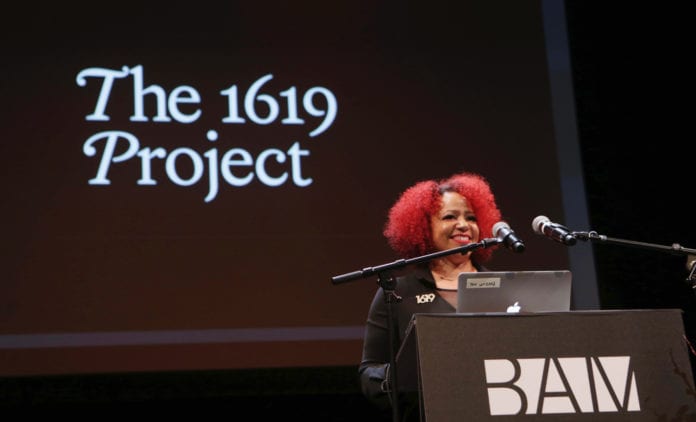by Tom Jones — (POYNTER) —
Of all the thousands upon thousands of stories and projects produced by American media last year, perhaps the one most-talked about was The New York Times Magazine’s ambitious “The 1619 Project,” which recognized the 400th anniversary of the moment enslaved Africans were first brought to what would become the United States and how it forever changed the country.
It was a phenomenal piece of journalism.
And while the project in its entirety did not make the list of Pulitzer Prize finalists, the introductory essay by Nikole Hannah-Jones, the creator of the landmark project, was honored with a prestigious Pulitzer Prize for commentary.
After the announcement that she has been awarded the Pulitzer Prize, Hannah-Jones told the Times’ staff it was “the most important work of my life.”
While nearly impossible, and almost insulting, to try and describe in a handful of words or even sentences, Hannah-Jones’ essay was introduced with this headline: “Our Democracy’s Founding Ideals Were False When They Were Written. Black Americans Have Fought to Make Them True.”
In her essay, Hannah-Jones wrote, “But it would be historically inaccurate to reduce the contributions of black people to the vast material wealth created by our bondage. Black Americans have also been, and continue to be, foundational to the idea of American freedom. More than any other group in this country’s history, we have served, generation after generation, in an overlooked but vital role: It is we who have been the perfecters of this democracy.”
Hannah-Jones’ and “The 1619 Project,” however, were not without controversy. There was criticism of the project, particularly from conservatives. Former Speaker of the House Newt Gingrich called it “propaganda.” A commentator for The Federalist tweeted the goal of the project was to “delegitimize America, and further divide and demoralize its citizenry.”
But the most noteworthy criticism came from a group of five historians. ln a letter to the Times, they wrote that they were “dismayed at some of the factual errors in the project and the closed process behind it.” They added, “These errors, which concern major events, cannot be described as interpretation or ‘framing.’ They are matters of verifiable fact, which are the foundation of both honest scholarship and honest journalism. They suggest a displacement of historical understanding by ideology.”
Wall Street Journal assistant editorial features editor Elliot Kaufman wrote a column with the subhead: “The New York Times tries to rewrite U.S. history, but its falsehoods are exposed by surprising sources.”
In a rare move, the Times responded to the criticism with its own response. New York Times Magazine editor-in-chief Jake Silverstein wrote, “Though we respect the work of the signatories, appreciate that they are motivated by scholarly concern and applaud the efforts they have made in their own writings to illuminate the nation’s past, we disagree with their claim that our project contains significant factual errors and is driven by ideology rather than historical understanding. While we welcome criticism, we don’t believe that the request for corrections to The 1619 Project is warranted.”
That was just a portion of the rather lengthy and stern, but respectful response defending the project.
In the end, the 1619 Project — and Hannah-Jones’ essay, in particular — will be remembered for one of the most impactful and thought-provoking pieces on race, slavery and its impact on America that we’ve ever seen.
And maybe there was another reason for the pushback besides those questioning its historical accuracy.
As The Atlantic’s Adam Serwer wrote in December, “U.S. history is often taught and popularly understood through the eyes of its great men, who are seen as either heroic or tragic figures in a global struggle for human freedom. The 1619 Project, named for the date of the first arrival of Africans on American soil, sought to place ‘the consequences of slavery and the contributions of black Americans at the very center of our national narrative.’ Viewed from the perspective of those historically denied the rights enumerated in America’s founding documents, the story of the country’s great men necessarily looks very different.”
There’s no question that Hannah-Jones’ essay, which requires the kind of smart thinking and discussion that this country needs to continue having, deserved to be recognized with a Pulitzer as the top commentary of 2019. After all, and this is not hyperbole, it’s one of the most important essays ever.
In addition, we should acknowledge the other two finalists in this category: Washington Post sports columnist Sally Jenkins and Los Angeles Times columnist Steve Lopez.
Jenkins continues to be among the best sports columnists in the country. Meanwhile, has any writer done more to shine a light on homelessness than Lopez? This is the third time in the past four years (and fourth time overall) that Lopez has been a finalist in the commentary category.
In any other year, both would be deserving of Pulitzer Prizes. But 2019 will be remembered for Nikole Hannah-Jones’ powerful essay and project.



